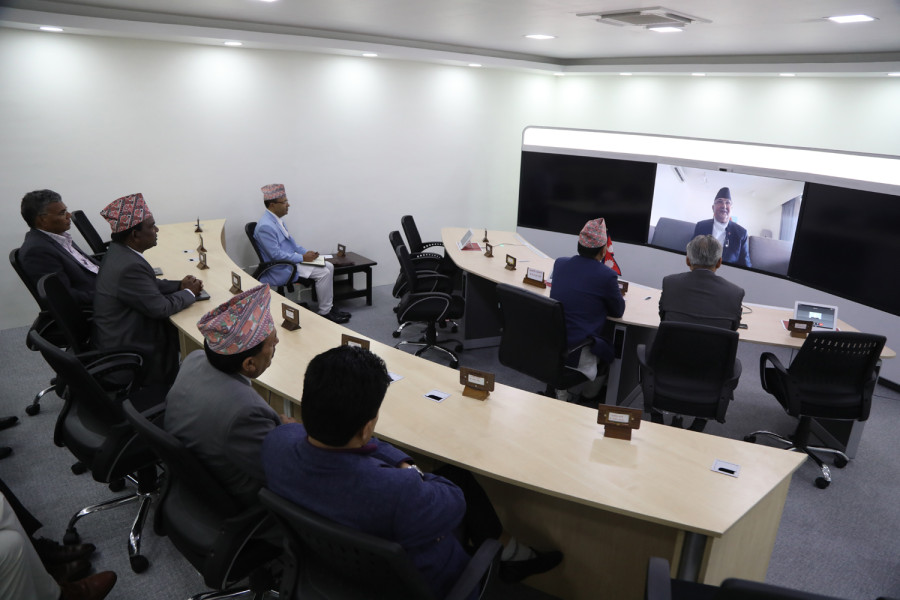National
Oli holds teleconference again to show all is well, but many don't buy it
Oli’s aides say the prime minister wanted to send a message that he is in good health and very much in command, but others want a proper update.
Anil Giri
First, there was much ado about nothing. Then, there were criticisms, claims and counterclaims. And when the dust had just settled, Prime Minister KP Sharma Oli, on Tuesday, held yet another teleconference from Singapore to “talk” to his Cabinet.
The first teleconference, held on August 26, was called the first-ever video conference meeting of the Council of Ministers—both by Oli and his political adviser Bishnu Rimal. But Minister for Communication and Information Technology Gokul Baskota refrained from calling it a Cabinet meeting. In Parliament last Thursday, Baskota said that the prime minister just wanted to say “hello”.
But that teleconference also invited a lot of criticism, with many raising questions over security measures and whether it was even necessary for the prime minister to speak to his Cabinet when he has an acting deputy in place.
Tuesday’s video conference raised similar questions, with some even asking whether Oli was attempting to send a message from Singapore, where he has been since August 22 for medical treatment.
Holding a Cabinet meeting and a conversation with Cabinet colleagues from abroad is wrong practice, said Ramesh Nath Pandey, a former foreign minister.
“Ministers are bound by the oath of office and secrecy. If they communicate through video conferencing, it can be considered a serious breach of the oath of secrecy,” said Pandey. “Second, no one is allowed to enter the Cabinet meeting hall. Third, if Defence Minister Ishwar Pokhrel has been given charge of the government as acting prime minister, he should be heading the Cabinet meeting, not Oli.”
Although Tuesday’s video conference was characterised as a simple “talk”, the manner in which the conference unfolded says otherwise.
On Tuesday, all ministers present in the Action Room of the Office of the Prime Minister apprised Oli of their respective ministries’ activities. Oli also held a separate meeting with Subas Chandra Nembang, deputy parliamentary party leader of the ruling Nepal Communist Party, and asked about parliamentary proceedings and the status of stalled bills, according to an aide.
According to a government official, since Chief Secretary Lok Darshan Regmi has already contested August 26’s video conference, the recent meeting would only complicate matters.
“The chief secretary told the ministers that it would set a wrong precedent,” the official told the Post on condition of anonymity as he was not allowed to speak to the media. “He was of the view that such meetings cannot be termed a Cabinet meeting in terms of process and legal background.”
Baskota, who is also the government spokesperson, had held a press conference last week to clarify that no Cabinet meeting was held through videoconferencing. But questions remain—Cabinet meeting or no Cabinet meeting, why is a video conference necessary?
The simpler answer is that Oli wants to dismiss all rumours of his health and send a message to the public that he is recovering well and that he is very much in command, said one of Oli’s aides on condition of anonymity.
Oli, who underwent a kidney transplant in 2007, is currently undergoing plasmapheresis at Singapore’s National University Hospital. He left for further medical treatment just 10 days after returning from the same hospital.
But so far, no concrete information has been released by the government or Oli’s aides about his health.
“It should be the job of advisers like Rimal, who is accompanying Oli to Singapore, to inform the country and people that the prime minister is doing fine and his health condition is improving,” said Hari Roka, a political analyst. “The prime minister doing fine health-wise would be of great benefit to his advisers so a section of people around Oli wants to show that he is recovering and is very much in command,” said Roka.
Despite the video conference, a health report hasn’t been released and the prime minister’s health remains very much a mystery.
“What are the Office of the Prime Minister and the Health Ministry doing? Are they not responsible for giving updates on the prime minister’s health?” said Roka.
Just as Oli was preparing to fly to Singapore for the second time, several rumours were doing rounds—all because no information on his health condition was given upon his return. At a few public appearances, as well as in Parliament, Oli had repeated that he “is fit and fine”.
It was only after people began to ask why Oli needed to fly to Singapore again that his personal physician, Dr Dibya Singh, issued a statement saying Oli needed to undergo plasmapheresis, a process that filters the blood and removes harmful antibodies.
Oli so far has completed six cycles of plasmapheresis in Singapore and will be returning on Friday.
But the people deserve to know the health condition of their prime minister through the proper channels and not through vague messages of good health, according to Roka.
“[Why] should we always trust what the people around the prime minister say?” he said.




 16.12°C Kathmandu
16.12°C Kathmandu














